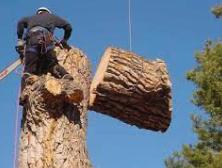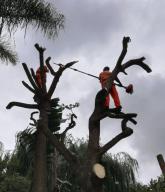Lemon Trees

Problems With Your Lemon Tree not Bearing Fruit
Reasons for No Fruit on Lemon Trees
The first query here would be, do the trees flower? Flowers lead to fruit, and a lack of blooms means your tree cannot produce. Some reasons for this would be incorrect cultivation, lack of nutrients, insufficient water and bad rootstock.
If the plant does bloom but still fails to fruit, this might be because the tree is not old enough. Lemon tree fruiting occurs at three to five years old, depending upon the rootstock. Blossom drop is one of the key growing lemon tree problems. Many of the newly forming fruits fall off well before they can begin to grow. This lack of “fruit set” may be due to an excess of fruits, too much water, low nutrients or exposure to cold.
Also, make sure the fertilizer you apply in early spring is formulated for citrus trees and is high in potash. Avoid excess nitrogen during the flowering period as this spurs leafy growth and minimizes the production of flowers.
Potassium for flower – nitrogen for leaves – phosphorus? For roots
How to Encourage Fruit on Lemon Trees
Water the tree deeply and frequently during fall and half the amount of irrigation in winter. Resume the deep watering in spring and summer as these juicy fruits need plenty of moisture to form.
Fertilize in spring with an appropriate food, including the addition of phosphorus to encourage blooming and fruiting, and prune only where necessary. Fruits set on the ends of branches, so it is best to remove only dead wood and problem branches.
- Site selection is important: South to South-east exposure, full sun, protected from strong winds and without competition from other trees/shrubs/perennials and turf grass. Citrus are shallow rooted so do not plant grass within 90 cm ( 3 feet) of the base of the trunk as it will compete for nutrients and water
- Regular applications of fertilizer with nitrogen and potassium are necessary. Regular thin applications of compost or organic mulch help as well. A citrus fertilizer is often used as it supplies chelated micro nutrients like iron and manganese
- Aside from this, other reasons a lemon tree won't bear fruit is that the tree is not old enough. Citrus trees normally don't produce fruit until they have been in the ground for three to five years.
- Citrus trees, like lemons, prefer a moist, well-drained, organically rich soil. Heavy soils, high salinity or poorly draining soils can result in poor fruit set and overall decline in health.
- Fertilize your lemon tree with one application of nitrogen fertilizer at the recommended amount any time from December to February, or divide the nitrogen fertilizer into three applications in February, July and September. Mature lemon trees need 2 to 3 pounds of nitrogen per year.
- Inspect your lemon tree for signs of pests and apply the proper pesticides during the correct periods in the season. Improperly applying pesticides can be as detrimental as the pests themselves. Common lemon pests include leafminers, rose beetles, snails, grasshoppers and aphids. When populations aren't kept in check, poor fruit development, leaf discoloration and other problems can become severe.
- Remove the grass around the base of the tree and outwards to the drip line. While grass won't necessarily harm the tree, it can harbor weeds that can compete with the lemon tree; the grass can also compete for nutrients.
- Mulch under the drip line of the tree to help conserve soil moisture, regulate the temperature and prevent weeds from coming up under the tree.
- Prune your lemon tree in winter to avoid sunburn. Lemon trees need thinning and heading back, since they're prone to vigorous spurts of shoot growth. Managing the shoot growth by proper pruning can help the tree's vigor and fruit development.

